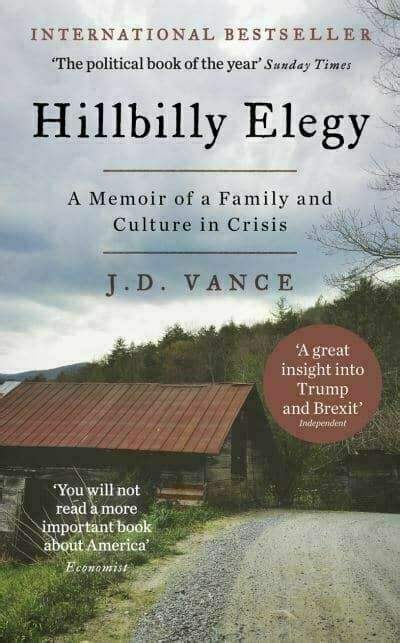📚Finished reading Hillbilly Elegy by J D Vance.
Yes, this is the famous autobiography of the current US vice-president, JD Vance. It is difficult, probably impossible, for me to read it outside of the context of the obsequious horrors he has gone on to do or support since. Nonetheless, I felt compelled to see if his book would help me understand what made him into the person that he became today.
At the time of its release the book generated some favourable commentary about its realistic portrayal of the oft-overlooked White working-class life in some quarters. Other people believed it did little else but engage in poverty-porn and reinforce negative stereotypes.
A good fraction of the book is the experiences of his child and young adult-hood. He does appear to have grown up in very economically and socially challenging circumstances. His parents did not provide him with anything remotely approaching the childhood we should want for all of our youngsters. Instead: desertion, drugs, threats, violence. A fairly largely proportion anyone’s list of potential adverse childhood experiences are on show here.
He was largely saved by his grandparents. They had their own struggles but, particularly his grandmother, became a positive role model in his life. He ended up doing very well at school. He later joined the Marines which he attributes with giving him a sense of discipline and responsibility. Next up he goes to Ohio State University and then to one of the pinnacles of American educational privilege - Yale Law School.
So, a classic rags-to-riches story.
That he expects everyone else to be able to replicate perfectly.
Yes, in between the slightly horrifying anecdotes we have constant infusions of “poor people are all lazy” and “underprivileged people should just have tried harder”. It’s the classic right-wing view, often to be found from those who did somehow make it from a deprived background into the bastions of elite privilege. I get the intuition, especially if you believe you did it yourself. The only problem is that that belief is basically never true.
Nonetheless if we discount the repeated humble-bragging, it’s clear to see he believes that he has power and status entirely basically because he…um…tried hard. So the only reason that every American doesn’t go to Yale Law is because they didn’t try as hard as him and, what’s more, they should have.
At times he comes so close to drawing what I see as the correct conclusions from his life experience that it’s painful to watch him retreat back into his tedious and predicatable rhetoric. I mean, part of the reason he was able to go to Yale Law was because of the Veterans Affairs “Yellow Ribbon” program whereby the state funded half his tuition. And Yale Law funded the other half due to his poverty-stricken background.
“The truth is, if it was not for the Yellow Ribbon Program I would not be going to law school.” he said, before leaving that fact out of his autobiography.
But the Yale Law funding side of things did make it in:
Yet the financial aid package Yale offered exceeded my wildest dreams…
In my first year, it was nearly a full ride. That wasn’t because of anything I’d done or earned — it was because I was one of the poorest kids in school. Yale offered tens of thousands (of dollars) in need-based aid. It was the first time being so broke paid so well."
Need based aid! Wow! Such DEI! So much affirmative action. Its a version of the same policies that are now pure anathema to him and the administration he’s part of.
I mean this days, his past actions would presumably have got him fired based on what Politifact’s interviewee reports:
Burke told PolitiFact that Vance served on the Yale Veterans Association, which Burke called “an affinity group that is considered a DEI group” and said it “was doing DEI work to increase veteran enrollment.”
Later he makes a big show and dance of the time when his grandma’s medical bills went up to the point that she couldn’t afford them. That’s a traumatic, potentially damaging or deadly, time for anyone so afflicted to be sure. All to common a US experience from what I understand. My genuine deepest sympathies to you all.
However, the conclusion he reaches from that is not, as you might expect from the rest of his book, that his grandmother didn’t try hard enough - that she deserved to die an agonising death because she is too poor to afford medical care. That she brought it on herself by not managing to get into Yale Law.
Instead, like a hero, having recently received his first big lawyer’s check, he swoops in to fund it for her, immensely proud that he could do so. Presumably blind-sided by his own glowing magnificence enough not to have noticed the rank hypocrisy of providing financial medical aid to his grandmother whilst despising the very existence of state programs like Medicaid that provide assistance to other people’s grandmothers. The grandmothers who don’t have sons lucky enough to have affirmative-actioned themself into the Ivy League.
The book cuts off well before his “Trump is Hitler” phase let alone his “Trump is the Greatest” phase. But we all know what happened next.
